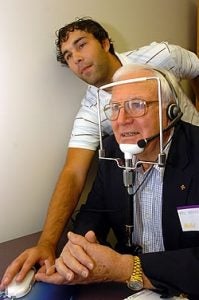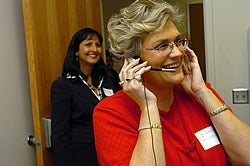Longtime supporters, Scottish Rite Masons, visit ECU Speech Language and Hearing Clinic
GREENVILLE, N.C. — North Carolina Scottish Rite Masons who are in the middle of a $5 million fund-raising campaign toured East Carolina University’s new clinic on Oct. 13. The fraternal organization is raising funds for speech, language and hearing clinics at Appalachian State University, the Scottish Rite Center in Charlotte and at ECU, which the Masonic organization has supported for 34 years.

ECU doctoral student Matt Carter of Winston-Salem assists Mason Eric Meace of Myrtle Beach in testing a computer program that flashes words on a screen that a patient must repeat during a tour of the ECU Speech Language and Hearing Clinic. (Photo by Cliff
Since 1972, North Carolina Scottish Rite Masons have given almost $1 million to ECU’s Scottish Rite Childhood Language Disorders and Dyslexia clinical program. More than 4,500 children have been seen in the clinic since that time.
The Masons kicked off the fund-raising effort because they wanted to do more, said Bill Brunk, a Raleigh-area orthodontist who serves as Sovereign Grand Inspector General in North Carolina. “We think this is really an important endeavor and we want to make sure it succeeds and continues in the future,” Brunk said.
Speech and language services are provided by faculty and graduate students in the ECU Department of Communication Sciences and Disorders in the School of Allied Health Sciences. The Scottish Rite program specializes in diagnostic evaluations for children and adolescents who are suspected of having or have been diagnosed with a language-based learning disability including problems with pre-reading skills, reading, writing, understanding speech or expressing themselves.
Dr. Marianna Walker, associate professor, said 80 to 90 percent of learning disorders are language-based. Part of the problem is many children with a learning disability never get evaluated and don’t reach their full potential.
The Scottish Rite Clinic aims for every child to succeed by diagnosing and treating children as early as possible. “Many of the people who come to ECU don’t know where to go or what to do,” Walker said. “A parent knows before anyone else that something is going on with their child.”
Betty Smith, clinical professor and director of clinical operations, shared success stories about dyslexia, which often runs in families. “We encourage language and speech intervention with preschoolers because we are able to remediate some areas of weakness and give those at risk a head start,” Smith said.
The clinic had been in an annex beside Belk Building, which had been home to the ECU School of Allied Health Sciences before moving to the Health Sciences Building on west campus this summer.
“The program is giving students the skill and wherewithal to go out and provide services,” said Dr. Stephen Thomas, dean of the School of Allied Health Sciences. “They become your ambassadors for what you’ve done here. It is an opportunity to expand what we’re doing beyond the walls of this building. Families are now able to see progress in their children and opportunity for their children.”
Masons first got involved with speech and language disorders about 50 years ago because of the needs of a Colorado boy. The idea quickly spread across the nation. “Masons tend to be very charitable. We want to do some good for the community around us,” Brunk said.
Anyone can refer to the clinic. For more information, go to www.ecu.edu/cs-dhs/csd/clinic.cfm. For an appointment, call 744-6104.

Masonic visitor Pamela Adams of Youngsville reacts to hearing her voice on the frequency altered feedback device during a tour of the ECU Speech Language and Hearing Clinic. ECU Associate Professor Marianna Walker watches. (Photo by Cliff Hollis)